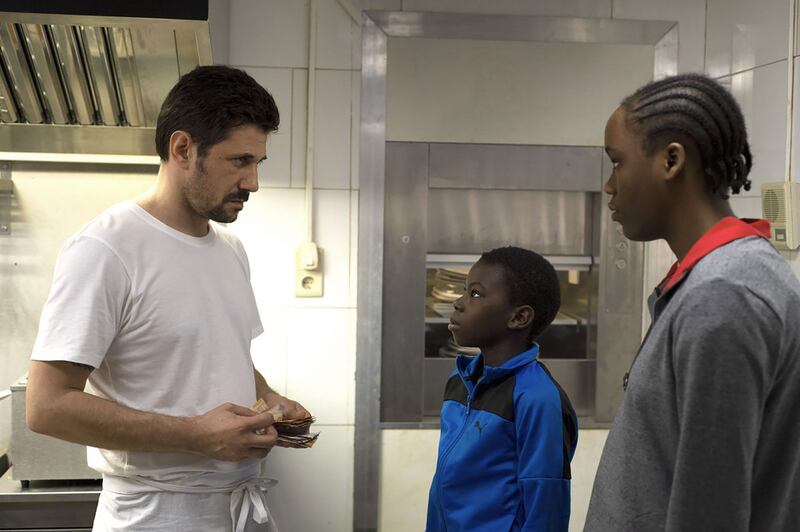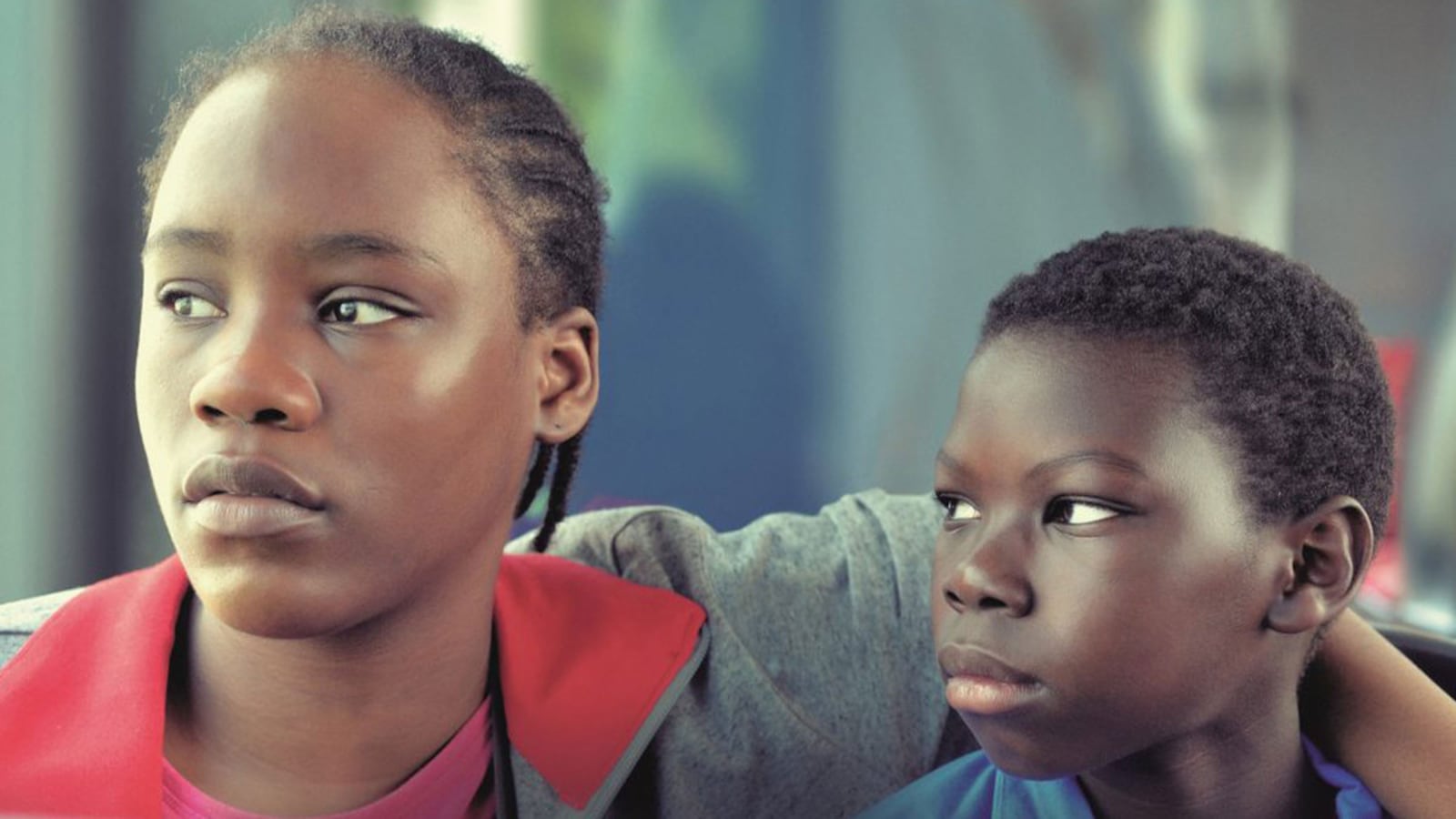No one makes films that are simultaneously as gritty and lyrical as Jean-Pierre and Luc Dardenne, the Belgian directorial duo responsible for some of the greatest big-screen works (Rosetta, The Son, The Child) of the past four decades.
The internationally acclaimed siblings are cinematic titans with a gift for telling stories—primarily about marginalized individuals enduring everyday hardships—with a gripping vérité authenticity that blossoms into heartrending poetry. Fiercely political filmmakers who never resort to sermonizing, they shine an illuminating light on suffering, destitution, loss and injustice through empathetic portraits of the desperate and downtrodden. They’re humanists of the most masterful kind. And their latest, Tori and Lokita (in theater March 24), is one of their absolute best.
Winner of the 75th Anniversary Prize at the 2022 Cannes Film Festival, the Dardennes’ 12th fictional feature is set in a nondescript Belgian neighborhood that’s home to Tori (Pablo Schils) and Lokita (Joely Mbundu), two African immigrant kids striving to survive on the margins.
An introductory interview with Lokita by a bureaucrat finds the teenage girl struggling to supply a convincing narrative for how she found her “sibling” Tori at an orphanage. This is part of the process required to receive official documentation, and when it doesn’t go well, Lokita finds solace in the company of Tori, an adolescent boy who’s more mature than his years, and with whom she lives at a public center for children in their circumstances.

Lokita takes pills for her anxiety, and as Tori and Lokita soon reveals, she’s got plenty of it. Tori and Lokita work at a restaurant where they sing karaoke songs for dining customers, although their main method of earning money comes from Betim (Alban Ukaj), a chef who employs them as his nightly drug dealers.
Confiscating their phones before sending them out with narcotics, Betim is a harsh and controlling taskmaster, and regardless of the fact that he always feeds them focaccia once they’ve completed their evening rounds, he’s a creep who cares only about himself, and how he can use his underlings to his advantage. Case in point: his demand that Lokita additionally provide him with sexual favors—something to which she has no choice but to accede.
Betim is both the pair’s meal ticket and a threat, and their livelihood and well-being are jeopardized from other directions as well. Firmin (Marc Zinga) is the criminal who smuggled Tori and Lokita into the country through Italy, and, with the aid of his sidekick Justine (Nadège Ouedraogo), he orders Lokita—in menacing terms—to make good on her continuing financial obligations to him.
Given her meager income, doing so means that Lokita has no money to send home to her clan, which doesn’t sit well with her mother, who suspects that her daughter is pocketing her earnings for herself. If those weren’t enough burdens on the girl’s psyche, there’s the ever-present fear of the police (and, relatedly, deportation), as the two are reminded when Tori’s reckless dash across the street in traffic attracts the attention of nearby officers.
The Dardennes don’t emphasize any one of the incidents along Tori and Lokita’s path; rather, they simply remain close to the characters (often from behind) via the intimate, dynamic handheld camerawork that’s long been their trademark. Their extended single takes and close-ups are as superficially unassuming as the pace of their action.
Yet there’s subtle, breathtaking artistry in their compositions, which routinely position Tori and Lokita as parallel figures—be it walking down the street or lying in bed—in order to convey their deeply rooted kinship, and the way in which it sustains them through thick and thin. A late sequence that finds a limping Lokita resting her hand on Tori’s slender shoulder for support as they flee danger underscores this protective dynamic.

Lokita is besieged on all sides, and her dilemma grows more dire when she fails to convince authorities that she’s Tori’s sister—a lie that, had it succeeded, would have allowed her to stay in the country, since Tori already has legal papers. Thus, her sole option is to return to Betim for assistance, and he provides it, albeit at a steep price, promising her documentation if she takes a job overseeing, and tending to, his marijuana stash in a remote building on the outskirts of town.
Lokita begrudgingly accepts this gig, which necessitates living alone in a dingy concrete room, but being separated from Tori proves too great a strain, and it’s not long before the young boy finds a way to reunite with his partner—and, also, to hatch a risky plan that will possibly get them out of their financial hole.
With a keen eye, Tori and Lokita navigates this fringe milieu of illicit commerce, persistent peril and difficult do-or-die decisions. The film’s placid aesthetics (which, per Dardennes convention, feature no score) help the directors strip away any artificial barriers between the audience and their subjects, thereby eliciting immense, compassionate engagement with Tori and Lokita’s plight.
It also creates significant suspense, especially in the latter half, when the duo embarks upon a mission that’s rife with pitfalls. From a strange noise to a wayward glance, hazards seem to be omnipresent. Even at this critical juncture, however, the Dardennes don’t unduly tighten the screws; everything that takes place stems from that which came before it, lending the material its invigorating realism.
As with many prior Dardennes stars, first-timers Mbundu and Schils’ performances are guileless; there’s never a moment when one can see them acting. Together, they turn Tori and Lokita’s ordeal into an affecting case study of manipulation and abuse, all of which breeds shame and self-loathing, as well as fosters a touching measure of solidarity.

Refusing to overtly or dramatically preach, the Dardennes present a world in which cruelty exists naturally alongside kindness, and the poor and the helpless are inherently vulnerable to anyone (of any creed or color) determined to exploit their position of power for selfish gain. It’s a treatise as bleak as it is bracing, and it’s made all the more poignant by a final scene which contends that true families are comprised of people who stick by you no matter what, singing lullabies of comfort, consolation, sorrow and love.
Liked this review? Sign up to get our weekly See Skip newsletter every Tuesday and find out what new shows and movies are worth watching, and which aren’t.






